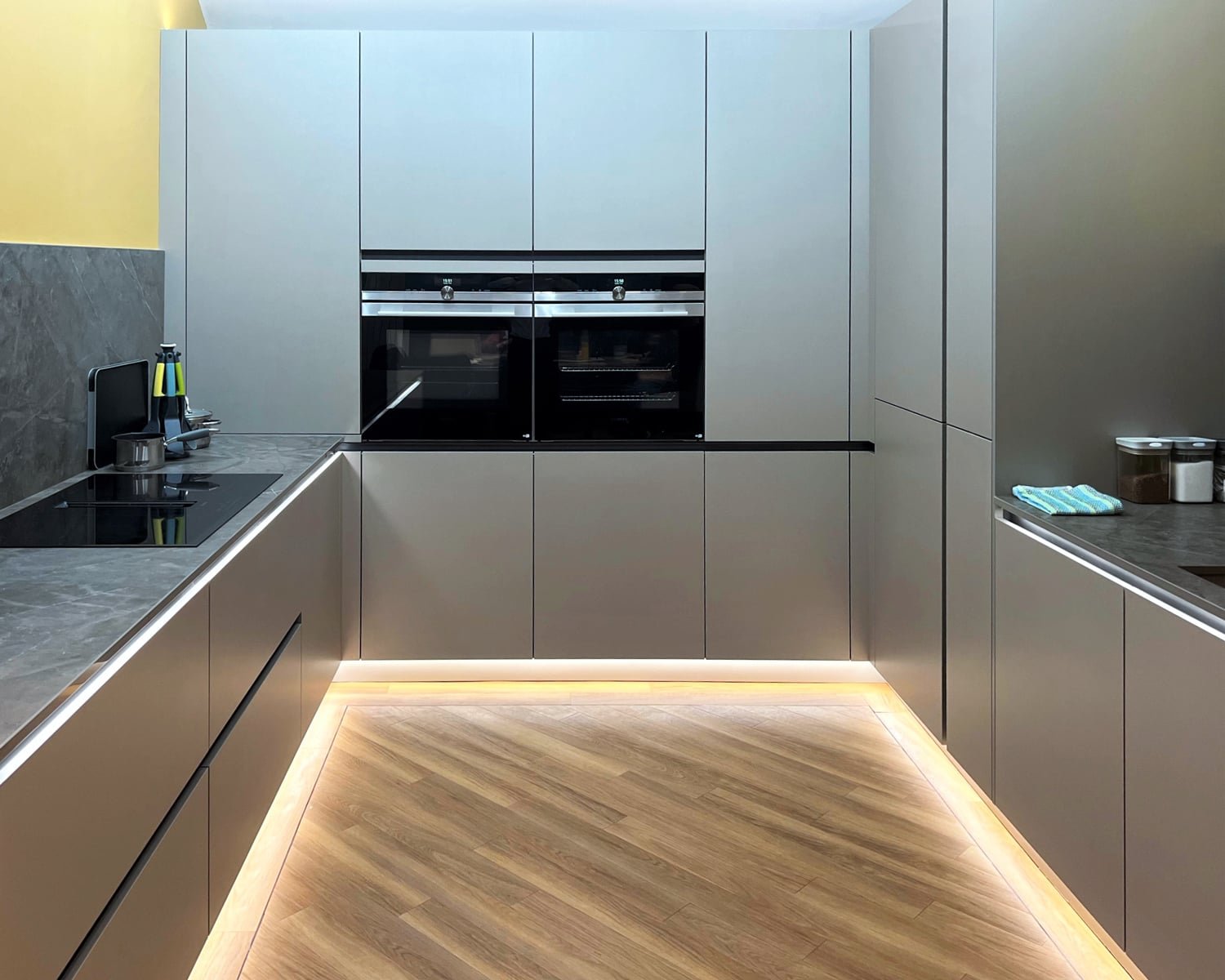How Much Does A New German Kitchen in the UK Cost?
A kitchen can be a significant financial investment, and the costs can vary significantly depending on various factors. In this blog, we’ll discuss some key factors that can affect the price of a kitchen in the UK, as well as some tips for keeping those costs down.
How much does a kitchen in the UK usually cost?
It’s helpful to have a sense of the average cost of a fully fitted kitchen in the UK before you begin searching for your perfect kitchen. As with most things, the price can vary greatly depending on the type of materials used and the level of customisation.
The cost of a fully fitted kitchen from BCK Interiors can range from £15,000 to £35,000, depending on the size and complexity of the kitchen.
If you have a small kitchen with a single wall of units, you can expect to pay between £15,000 and £20,000.
For a medium-sized kitchen with units on both sides and a small island, the cost may be in the range of £20,000 to £25,000. And for a large kitchen with a long wall of units and a large island, the cost could be anywhere from £25,000 to £35,000.
It’s important to remember that these are just estimates, and the actual cost of your kitchen may vary depending on various factors, including the materials you choose, the appliances you select, and any additional features or customisation you may want.
What does a typical kitchen renovation cost breakdown look like?
When renovating a kitchen, several critical components make up the total cost. According to industry estimates, the typical cost percentages for a kitchen renovation breakdown as follows:
Furniture: This category includes cabinets, drawers, and any other storage or display units you may have in your kitchen. Furniture typically makes up the most significant percentage of the total cost of a kitchen renovation, with estimates ranging from 40% to 50%.
Worktops: Worktops refer to the surfaces you use for food preparation and serving, such as countertops, islands, and backsplashes. Worktops typically make up around 20% of the total cost of a kitchen renovation.
Appliances: This category includes appliances such as ovens, ranges, refrigerators, and dishwashers, as well as smaller items like sinks and taps. Appliances typically make up around 20% of the total cost of a kitchen renovation.
Installation: The installation cost includes labour and any other fees associated with installing your new kitchen. This category typically makes up around 10% of the total cost.
Which factors increase kitchen renovation costs?
Higher-priced group doors: The type of doors you choose for your kitchen can significantly impact the cost. Lacquered and wood veneer door finishes are more expensive than laminate door finishes.
Drawers: Both external and internal drawers can add to the cost of a kitchen renovation, especially if you opt for high-end options with special features like glass sides.
Pull-out mechanisms: If you opt for a pull-out larder, the cost of your kitchen renovation will be higher than if you had just added an extra shelved cabinet. The same applies to other storage solutions with mechanisms such as pocket doors.
High-end appliances: If you choose high-end appliances, such as those from brands like Miele, you can expect to pay more for your kitchen renovation.
How can you keep the costs of a new kitchen down?
There are several ways to keep the costs of a new kitchen down while still achieving excellent quality. Here are a few ideas:
More competitively priced doors: Instead of choosing higher-priced finishes in lacquer or wood veneer
These doors can still provide a high level of quality and durability, and they can help to reduce the overall cost of your kitchen.
A mix of hinged door storage units and drawers: Rather than going overkill with drawers, which can be more expensive, consider a combination of hinged door storage units and drawers. This can help balance the cost while providing plenty of storage options.
A mix of shelved units and pull-out mechanisms: Planning your storage carefully can help to keep costs down. Consider which units really need pull-out mechanisms, and opt for shelved units in other areas to save money.
Mid-high-end appliances: Instead of choosing the highest-end appliances, consider mid-high-end options like those from brands like Siemens. These appliances can still provide excellent performance and quality, but they may be more affordable than top-of-the-line models.
Being smart with the design: There are many ways to be clever with the design of your kitchen to help reduce costs. For example, you could use lacquered doors in areas that are seen or touched and opt for colour-matched laminate panels in areas that are less visible or not touched as often. This can reduce costs while still providing a high level of quality and durability.
By considering these and other cost-saving strategies, you can create a beautiful new kitchen that meets your needs and fits your budget. Just be sure to carefully plan your design and compare prices from multiple contractors to get the best value for your money.
In summary, many factors can affect the cost of a kitchen renovation in the UK. By considering the size and layout of your kitchen, the materials you use, the appliances you choose, and the labour cost, you can better understand the costs involved and find ways to keep those costs down.
For more help designing and building a new kitchen for your home, contact BCK Interiors today. We’re here to provide professional advice and help you create the kitchen of your dreams!




